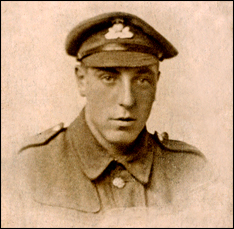Make Him Tell Their Stories

This is Robert Raymond. He died in 1916, in the trenches of France. He was my great-grandfather. His daughter, Hilda, will be 89 this year. She was born after he died. My great-grandmother, Edith, Hilda's mother, died at the age of 37, leaving my grandmother an orphan.
I have this photo of Robert, and I stare at it, trying to imagine what his life was like. I can't ask my grandmother; she never met him. And I try to picture the day that Edith received the news that the man whose child she was carrying had died in the war.
World War I was a colossal waste of life. It was a war that had no purpose, no planning, no meaning. It was The Great War. It cost Europe a generation of young men.
As far as I know, Robert Raymond's story has not been told. He has vanished; I'm not even sure where he is buried. Three generations later, all I have is this tiny photograph. I search his face for clues. What made him laugh? Cry? What were his dreams? What was his childhood like? When he was in the trenches, did he have a chance to reflect on what he was doing, why he was there; did he know he'd never get home to England again?
I wish that someone would sit down with George Bush and Donald Rumsfeld and Dick Cheney and make them look at the photographs of the 1700+ American dead in this war. I'd like them to have to talk to someone who loved each of those men and women, hear a story from his or her childhood, or what he or she liked to do, what he or she wanted to be, what made him or her laugh. I think the price for being Commander-in-Chief is to be haunted by the people you have sent to their deaths. I think the fact that you told lies in order to start this war should be the kind of black spot on your soul that all the invocation of God and country and Jesus cannot erase. I think you should have to wear a letter "M" for murderer, that in your wallet, when people ask to see photographs of your children, you should be forced to bring out a picture or two of soldiers you sent to their deaths. You should have to tell their stories.
"These are my children," you should have to say. "These are my kids, and I am responsible for their deaths."


2 Comments:
Very cool design! Useful information. Go on! Girls with glasses giving blowjobs Search sex threesome Hairy peeing porn sites Sex gay gratis hairy Paris hilton sample porno Cheerleader uniform upskirts The vibrator placed Dildos suddenly african american lesbian personals pamela anderson pics Babes in leather and mini skirts Mail order adult sex toys Naked teens cash Movie star porn pic Ava monster cock Milf crusin mature pussy Asian girls etreme squrting orgasms Jenna jameson nuse
Pathetic fucking pig
Post a Comment
<< Home